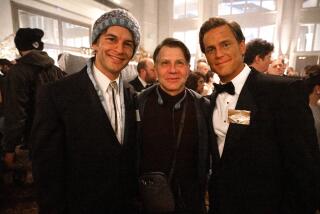PERSPECTIVE ON GAY RIGHTS : In Real Life, the Funnies Aren’t : A comic strip mirrors the consequences that gays and lesbians face when they refuse to be invisible.
- Share via
In the midst of the unedifying spectacle of the Senate hearings on gays and lesbians in the military, the right of homosexuals to serve in another cherished American institution is being challenged. Several newspapers have refused to print recent episodes of the “For Better or for Worse” comic strip, in which a gay teen-ager comes out.
The episodes feature strip protagonist Mike’s friend Lawrence, who realizes he is gay. His parents order him out of the house, but subsequently ask him back home and promise to try to accept his homosexuality. This week’s strips, published in the View section of The Times, show Lawrence coming out to Mike. Having told Mike that he’ll never get married, a worried-looking Lawrence explains that he has fallen in love, “but it’s not with a girl.” Mike--like so many straight people--reacts to a friend’s disclosure of his innermost truth by saying, “I don’t wanna know what you’re telling me, man!” Then, Mike attempts to reassure Lawrence by saying, “Look, you’re not gay, OK? . . . This guy you’ve met, it’s nothing special, see? You’re just confused!” To the credit of cartoonist Lynn Johnston, Lawrence says what so many of us who are gay wish we had said in such circumstances: “Mike, my mind is crystal clear. Everyone else is confused!”
The newspapers that have refused to run the strips give assorted explanations. The Sedalia, Mo., Democrat’s editor said, “We are a conservative paper in a conservative town. We consider it is a family comic strip and felt our readers would not appreciate this striking reference to homosexuality being inserted into it.” He says what too many people still say to lesbian and gay children and adults: We don’t want to know about you and we will behave as if you did not exist.
In a subsequent panel, Lawrence reaches out to Mike for support. Mike draws back, as if Lawrence’s needing his friend is a come-on. “There’s a big difference between friends and lovers,” Lawrence tells him. “And right now, I really need a friend.”
With uncanny accuracy, “For Better or for Worse” shows how gay invisibility works. Mike thinks Lawrence’s homosexuality is about Mike. Lawrence’s parents think it’s about them. And, apparently, the military brass and the senators and too many millions of Americans think lesbian and gay Americans’ sexuality is about them.
The real Lawrence might become one of the one in three recorded teen suicides who turn out to be lesbian or gay. He might become one of the uncounted numbers of victims of gay-bashing. Perhaps he will do what many of us still have to do--deny himself, learn to ignore his human need for intimacy, honesty, connection and happiness. Maybe he will end up serving his country in the military, where he may be subjected to systematic persecution. Why? What has Lawrence done wrong?
He told the truth about his own nature to a society that doesn’t want to know about it. The Las Vegas Review-Journal’s editor opined, in rejecting the strips, that the comic was “not offensive at all, but it was condoning homosexuality almost to the point of advocacy.” The danger Lawrence poses to the reader is like the one his brothers and sisters pose to the military self-image: not sex, but visibility. For some reason, this culture does not feel comfortable enough with its majority sexual orientation to tolerate those with a minority sexual orientation. Lawrence isn’t doing anything, let alone advocating anything. He is just telling the truth about himself.
The secret of homosexuality is no longer one gays and lesbians are willing to keep. We have learned a hard-fought lesson: that our sexual orientation can be the foundation for good and happy lives and that it is society’s attitude toward us that is immoral. We have begun to exchange secrecy for privacy; that is the keynote of our civil-rights struggle. We understand that democracy requires that we help our fellow citizens see us in the proper light; prejudice and bigotry take time to reverse. But in comic strips and in the military, we are facing the demand that we stay invisible; that we give our country not only the full measure of devotion that patriotic citizenship requires, but that we sacrifice our identities while doing it.
More to Read
The biggest entertainment stories
Get our big stories about Hollywood, film, television, music, arts, culture and more right in your inbox as soon as they publish.
You may occasionally receive promotional content from the Los Angeles Times.










